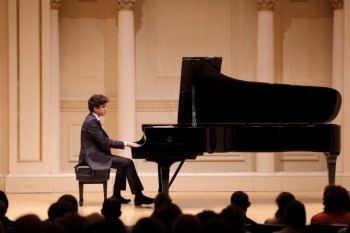How a blind Haverford College student navigates his world
By Connie Friedman
It was a chilly night – perfect for a brisk walk around the college. The pace, however, was not at all brisk. The fall leaves did not crunch beneath his feet. Instead, they were wisped aside by his guide stick. Right to left, left to right, as if mopping the ground. Daniel Gillen was methodical. He traced the earth with his cane as if it was radar, echoing back every whisper of the world. The cane was not Gillen’s only guide to the physical world. In fact, he had a heightened awareness for weather. There’s a slight chance of rain, he predicted. He knew the campus as if he existed on a contour map, relating every incline, every switch. When he walked through the cafe he made note of any shifted or misplaced furniture. Without his guidance stick, he preferred not to hold hands. Rather, he requested to be guided by the arm, as is the common practice. His fingers lightly grasped the guide’s bicep. Daniel Gillen is blind. He did not necessarily need the guidance, but he leaned on people for mere convenience – a convenience earned by his own perseverance.
Gillen, 19, was born into an Irish Catholic family as the oldest surviving son of Roger and Mignon Gillen. His father is a famous Irish musician who gained popularity after winning a contest on the country’s beloved Late Late Show Talent Search in 1981. While studying music in St. Louis, Gillen’s father met Mignon, a dancer at the college, and moved to New York. Gillen has lived his whole life on the Upper West Side on the 42nd floor apartment of a skyscraper. He describes his complex as a “town within a city.” His building has 452 floors filled with families of all sorts. But it is not the people that bother him. It is his lack of independence. “Living there, I always feel like I’m inside a shell. I can’t just go outside on to the street. The density and traffic flow are all very different. It’s just as dangerous as being out on a battle field,” said Gillen.
Despite the drawbacks of Manhattan, Gillen still likes the idea of an urban living environment. Maybe not in a megacity, Gillen said. However, he will not live in the suburbs. “Cars are too ubiquitous. I don’t trust autonomous vehicles in the research and development phase,” Gillen said. He prefers being near resources and people.
Resources are just the things that New York has offered Gillen who suffers from detached retinas. At age four, he attended Lighthouse International, an organization that assists with vision loss. The schools and programs at Lighthouse International helped Gillen develop social skills and an understanding of braille. At the age of six, Gillen joined the Filomen M. D’Agostino Greenberg Music School for those challenged with vision loss. His piano audition consisted of an exercise difficult for even those six years older than him. In his senior year at high school, Gillen performed Debussy’s “Premier Arabesque” at Carnegie Hall.
Gillen now attends Haverford College as a junior working towards a degree in physics and a minor in music. He’s aware of his gift and unique situation. “I am the first braille reader majoring in a STEM field at Haverford. I was curious about the way the world works and also I felt like I could relate a little more to quantitative and geometric things. I do like language and linguistics, although I’m not a polyglot,” Gillen said of himself. He is not modest and he’s not shy. His brashness results from his fight for the necessary accommodations to live a normal life. He has to pave the way wherever he goes including at Haverford. He came earlier than any student to study the campus, memorize its paths, and request all his material in braille.
Gillen uses an electronic braille typewriter for most of his schoolwork. “I get my textbooks in electronic braille format or hardcopy braille. I prefer braille texts over audio,” Gillen said. With his regular braille typewriter, Gillen made a map of California. Gillen scholastically described the map as “discrete lines where you can clunk the lines down on the page. I was putting a set of braille dots that represent a location within a matrix.” Gillen loves geography. He could name all the capitals and select cities of every country. As a child, he made a world map on his wall.
Gillen is obviously exceptional. His talent unfortunately comes with a price. “I have a small circle of friends. I don’t get together with them regularly,” he said. Gillen said he’s not involved in any extra curricular activities. Much of his time is dedicated to class prep, which means less socializing. It is also difficult to just run into people, Gillen said. His bright blue eyes show no sadness, no sincerity, and no emotion. They are glassy and artificial. As Gillen stands up to depart, he gives a hug full of tenderness. “Thank you for listening.” Gillen reluctantly spends much of his time in solitude. He snaps open his cane as the brisk wind blows through the door. The cane clicks and clacks as he twists and turns around the bushes to find his way home.

